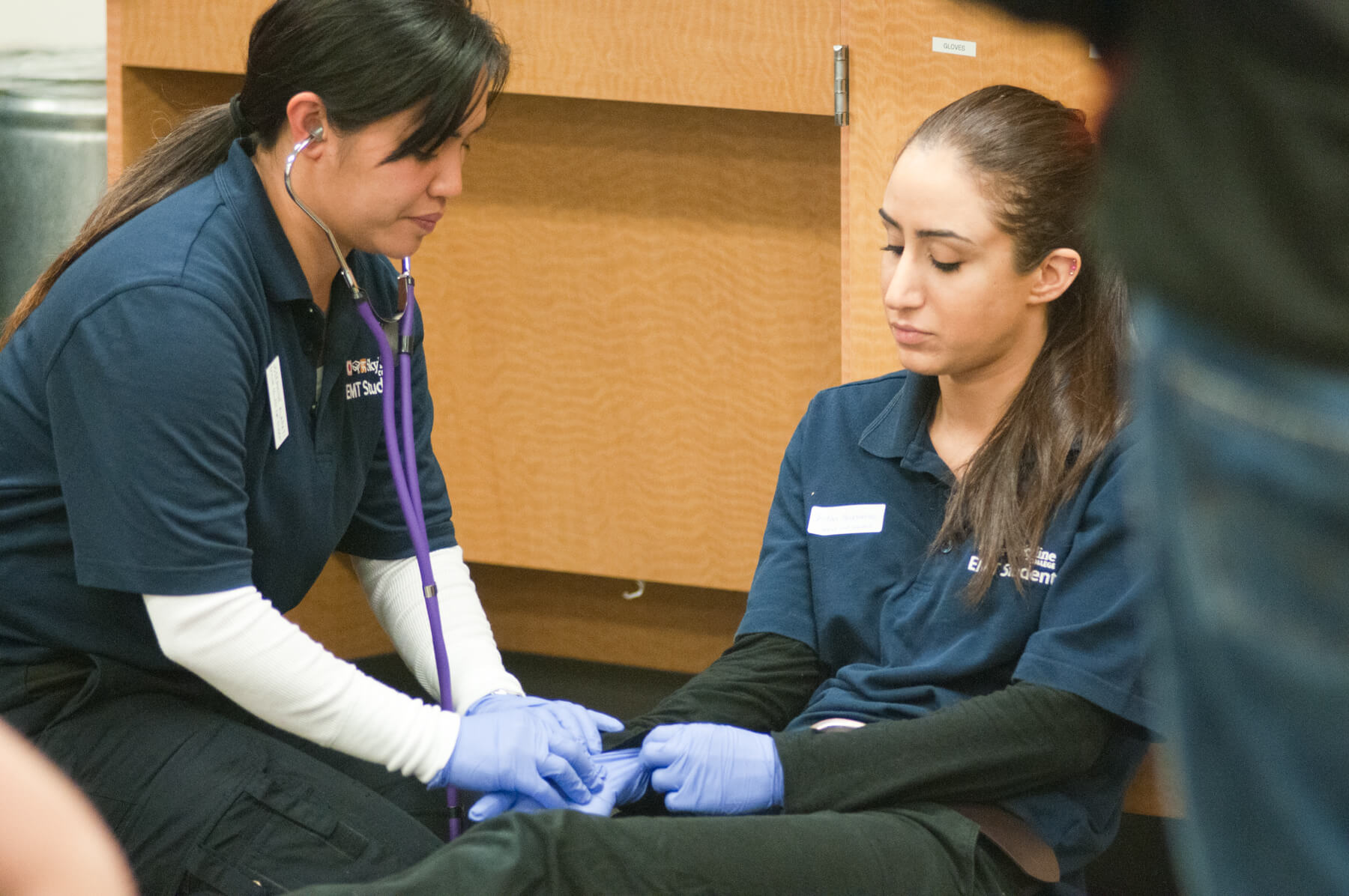Emergency Medical Technology
Apply NowBecome an EMT
Emergency medical technicians (EMTs) care for the sick or injured in emergency medical settings and lives often depend on their quick reaction and competent care.
The EMT program at Skyline College provides the student with a broad foundation of knowledge in anatomy, physiology, pathophysiology, and emergency care procedures in addition to didactic and skills training, observation in a local hospital Emergency Room and a ride-along rotation with a local ambulance company.

An EMT has the skills to assess a patient’s condition and to manage respiratory, cardiac, and trauma emergencies.
The Field
Emergency medical technicians (EMTs) care for the sick or injured in emergency medical settings and lives often depend on their quick reaction and competent care. EMTs respond to emergency calls, performing medical services and transporting patients to medical facilities, as well as non-emergency calls.
In order to succeed as an EMT, students must demonstrate grace under pressure and strong communication and problem-solving skills. EMT work is physically strenuous and can be stressful, sometimes involving life-or-death situations and patients who are suffering so students should be prepared to enter this challenging work environment.
The Program
The EMT Program at Skyline College represents the first phase of training in the Emergency Medical Technician career structure. The program provides the student with a broad foundation of knowledge in anatomy, physiology, pathophysiology, and emergency care procedures in addition to didactic and skills training, observation in a local hospital Emergency Room and a ride-along rotation with a local ambulance company. The program meets National EMS Education Standards and AHA guidelines. Click here to view the program approval letter by the County of San Mateo Health System.
In coordination with the Educational Access Center (EAC), reasonable accommodations will be provided for eligible students with disabilities. For more assistance, please visit EAC in Bldg 5, Room 5132 or call (650) 738‑4280.
Career Outlook
Becoming an EMT provides a strong foundation for students entering other careers involving pre-hospital emergency medical care such as para-medicine, fire-fighting, or law enforcement and also provides pertinent education for those considering other health fields including medicine, nursing, and physician assisting.
EMTs and paramedics are expected to see a 7 percent job growth rate over the next decade, on track with other job growth in the country. On average, EMTs and paramedics in California make an annual wage of $42,420 according to the U.S. Department of Labor.
Looking for classes offered in upcoming semesters?
Check out the current class schedule.| Program | Type | Total Units |
|---|---|---|
| Emergency Medical Technology | CS | 8 Units |
Upon completion of the program students will be able to:
- Demonstrate competency in the cognitive, psychomotor, and affective domains when providing emergency medical care.
- Pass their final written exam, which is comprehensive.
- Pass their National Registry written exam, which is administered off-site.
- Pass their National Registry Skills Exam.
Location: Building 7, Room 7-115
Phone: (650) 738-4310
Registration for EMC 410:
If this is your first time taking classes at the San Mateo Community College District, complete a Skyline College application to begin.
Before enrollment, the following prerequisites must be met:
- Students must be 18 years of age or older by the first day of class
- Current and valid American Heart Association BLS Certificate (taking and passing EMC 425 also meets this requirement)
- Please note that we can only accept this specific American Heart Association BLS certificate. If you do not have this certificate by the first day of class, you will not be able to continue with the class.
In addition to the required enrollment fees, students should be prepared to pay the following estimated course fees:
- Books: approximately $200.00
- Medical Supplies: approximately $75.00
- Clinical Requirements: approximately $150.00
Fees are subject to change without notice and current books and supply costs can be found on the Skyline College Bookstore website.
Clinical Sites Requirements:
All students admitted to the program are required to complete the following:
- a Health Report completed by a health care provider which includes a satisfactory physical examination and immunization documentation verifying freedom from communicable disease
- a social security referenced background check
- a drug test
Personal costs will be associated with these tests, and upon acceptance into the program, students will receive detailed instructions and deadline dates to successfully complete these items. If you are in need of current vaccinations, please contact the Skyline Health and Wellness Center directly for costs, hours of operations, and services offered. Students must submit the Health Report by the deadline provided by the course director. Those who do not comply with this requirement will not be eligible for their state-required clinical rotations.
California EMT Certification Eligibility Requirements:
- EMC 410 course completion certificate
- Successful completion of a state-approved Emergency Medical Technician (EMT)/EMC 410 Skills Final exam. After successfully completing the course, students must then take and pass the National Registry of Emergency Medical Technicians written exam to be eligible for a state EMT license. For more information on these tests, visit The National Registry of Emergency Medical Technicians website.
For further information, please contact:
Shruti Ranade, Program Services Coordinator, at ranades@smccd.edu